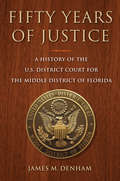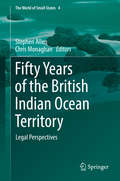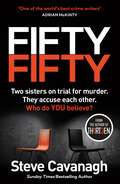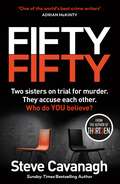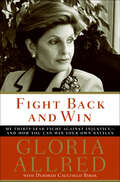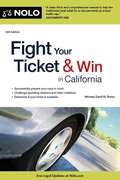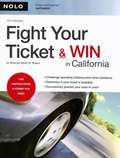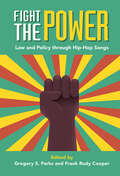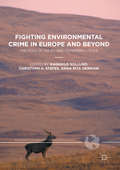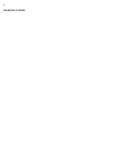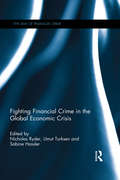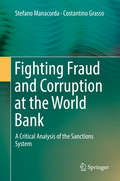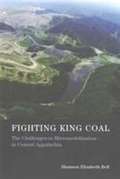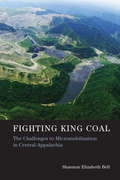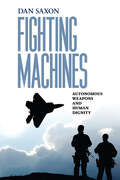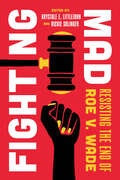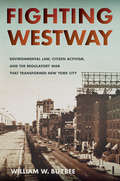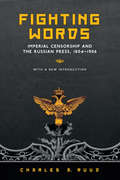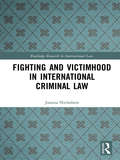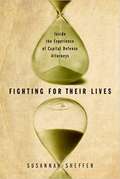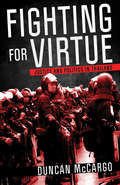- Table View
- List View
Fifty Years of Justice: A History of the U.S. District Court for the Middle District of Florida
by James M. DenhamThe verdicts have made headlines, but little is known about the inner workings of the court in which they were delivered. In Fifty Years of Justice, James Denham presents the fascinating history of the U.S. Middle District Court of Florida from its founding in 1962 to the present. Readers will discover the intricacies of rulings, the criminal defendants and civil litigants, and the dedicated officials—the unsung heroes—who keep the justice system running day to day. From desegregation to discrimination, espionage to the environment, trafficking to terrorism, and a host of cases in between, litigation in these courtrooms has shaped and shaken both state and nation.
Fifty Years of the British Indian Ocean Territory: Legal Perspectives (The World of Small States #4)
by Stephen Allen Chris MonaghanThis book offers a detailed account of the legal issues concerning the British Indian Ocean Territory (Chagos Islands) by leading experts in the field. It examines the broader significance of the ongoing Bancoult litigation in the UK Courts, the Chagos Islanders' petition to the European Court of Human Rights and Mauritius' successful challenge, under the UN Convention of the Law of the Sea, to the UK government's creation of a Marine Protected Area around the Chagos Archipelago. This book, produced in response to the 50th anniversary of the BIOT's founding, also assesses the impact of the decisions taken in respect of the Territory against a wider background of decolonization while addressing important questions about the lawfulness of maintaining Overseas Territories in the post-colonial era.The chapter ‘Anachronistic As Colonial Remnants May Be...’ - Locating the Rights of the Chagos Islanders As A Case Study of the Operation of Human Rights Law in Colonial Territories is open access under a CC BY 4.0 license via link.springer.com.
Fifty-Fifty: The Number One Ebook Bestseller, Sunday Times Bestseller, BBC2 Between the Covers Book of the Week and Richard and Judy Bookclub pick
by Steve CavanaghPART OF BBC TWO'S BOOK CLUB BETWEEN THE COVERSTWO SISTERS ON TRIAL FOR MURDER. THEY ACCUSE EACH OTHER.WHO DO YOU BELIEVE?'911 what's your emergency?''My dad's dead. My sister Sofia killed him. She's still in the house. Please send help.''My dad's dead. My sister Alexandra killed him. She's still in the house. Please send help.'One of them is a liar and a killer.But which one?********Your favourite authors LOVE Fifty-Fifty, the follow-up to the bestselling novel Thirteen:'A terrific writer. He has talent to burn.' Don Winslow'Trust me - it will keep you guessing until the very end.' Ian Rankin'Unpredictable, daring and completely compelling. Top notch writing.' Alex North'Very clever, darkly funny, moving, fast-paced.' Jane Casey'Steve Cavanagh writes the best hooks in the business' Mick Herron'Absolutely brilliant. Addictive, clever, pacy. Eddie Flynn is one of my heroes.' Jo Spain'Intelligent, sophisticated and tense.' Mari Hannah
Fifty-Fifty: The Number One Ebook Bestseller, Sunday Times Bestseller, BBC2 Between the Covers Book of the Week and Richard and Judy Bookclub pick (Eddie Flynn Series)
by Steve CavanaghPART OF BBC TWO'S BOOK CLUB BETWEEN THE COVERSTWO SISTERS ON TRIAL FOR MURDER. THEY ACCUSE EACH OTHER.WHO DO YOU BELIEVE?'911 what's your emergency?''My dad's dead. My sister Sofia killed him. She's still in the house. Please send help.''My dad's dead. My sister Alexandra killed him. She's still in the house. Please send help.'One of them is a liar and a killer.But which one?********Your favourite authors LOVE Fifty-Fifty, the follow-up to the bestselling novel Thirteen:'A terrific writer. He has talent to burn.' Don Winslow'Trust me - it will keep you guessing until the very end.' Ian Rankin'Unpredictable, daring and completely compelling. Top notch writing.' Alex North'Very clever, darkly funny, moving, fast-paced.' Jane Casey'Steve Cavanagh writes the best hooks in the business' Mick Herron'Absolutely brilliant. Addictive, clever, pacy. Eddie Flynn is one of my heroes.' Jo Spain'Intelligent, sophisticated and tense.' Mari Hannah
Fifty-Fifty: The Number One Ebook Bestseller, Sunday Times Bestseller, BBC2 Between the Covers Book of the Week and Richard and Judy Bookclub pick (Eddie Flynn Series)
by Steve CavanaghPART OF BBC TWO'S BOOK CLUB BETWEEN THE COVERSTWO SISTERS ON TRIAL FOR MURDER. THEY ACCUSE EACH OTHER.WHO DO YOU BELIEVE?'911 what's your emergency?''My dad's dead. My sister Sofia killed him. She's still in the house. Please send help.''My dad's dead. My sister Alexandra killed him. She's still in the house. Please send help.'One of them is a liar and a killer.But which one?********Your favourite authors LOVE Fifty-Fifty, the follow-up to the bestselling novel Thirteen:'A terrific writer. He has talent to burn.' Don Winslow'Trust me - it will keep you guessing until the very end.' Ian Rankin'Unpredictable, daring and completely compelling. Top notch writing.' Alex North'Very clever, darkly funny, moving, fast-paced.' Jane Casey'Steve Cavanagh writes the best hooks in the business' Mick Herron'Absolutely brilliant. Addictive, clever, pacy. Eddie Flynn is one of my heroes.' Jo Spain'Intelligent, sophisticated and tense.' Mari Hannah
Fight Back and Win: My Thirty-Year Fight Against Injustice—And How You Can Win Your Own Battles
by Gloria Allred Deborah Caulfield RybakVoted by her peers as one of the best lawyers in America, and described by Time magazine as "one of the nation's most effective advocates of family rights and feminist causes," Allred has devoted her career to fighting for civil rights and has won hundreds of millions of dollars for victims of abuse. She has taken on countless institutions to promote equality, including the Boy Scouts, the Friars Club, and the United States Senate. And as the attorney for numerous high-profile clients—including Nicole Brown Simpson's family, actress Hunter Tylo, and Amber Frey, Scott Peterson's girlfriend—Allred has helped victims assert and protect their rights. Throughout her memoir, Allred offers colorful—sometimes shocking—examples of self-empowerment from her personal and professional life. Presenting nearly fifty of her most memorable cases, Allred takes us deep inside the justice system to show how it's possible to win even in the face of staggering odds. Her inspiring true stories serve to remind us that winning justice depends on the righ-teousness of the cause and an individual's willingness to stand up, speak out, and fight back. Fight Back and Win is a powerful testament to Gloria Allred's trailblazing career and the battles she has fought alongside countless brave individuals to win justice for us all.
Fight Your Ticket & Win in California
by David BrownWin your traffic court case with the book that's helped thousands of Californians! A traffic conviction can add hundreds of dollars to your yearly auto insurance premiums. Fight Your Ticket & Win in California shows you how to handle your case in traffic court, get the right kind of hearing and win. Attorney David Brown provides you with the detailed tactics you need to: prepare and present your evidence argue before a judge cross-examine a police officer's testimony get your case dismissed appeal a decision determine the consequences of your violation The 14th edition provides the latest legal information for California drivers, including fines and penalties, and contains fully up-to-date information on recently signed legislation regarding cell phone use.
Fight Your Ticket & Win in California
by David W. BrownA traffic conviction can add hundreds of dollars to your yearly auto insurance premiums. Fight Your Ticket & Win in California shows you how to handle your case in traffic court, get the right kind of hearing and win. Attorney David Brown provides you with the detailed tactics you need to: . prepare and present your evidence . argue before a judge . cross examine a police officer's testimony . get your case dismissed . appeal a decision . determine the consequences of your violation This edition provides the latest legal information for California drivers, including fines and penalties, and contains fully up to date information on recently signed legislation regarding cell phone use. Check out Nolo's list of California products. Not a California resident? Check out Beat Your Ticket.
Fight Your Ticket in California (12th edition)
by David W. BrownBeat a bum ticket in California traffic court with this bestselling guide.
Fight the Power: Law and Policy through Hip-Hop Songs
by Gregory S. Parks Frank Rudy CooperTaking inspiration from Public Enemy's lead vocalist Chuck D - who once declared that 'rap is the CNN of young Black America' - this volume brings together leading legal commentators to make sense of some of the most pressing law and policy issues in the context of hip-hop music and the ongoing struggle for Black equality. Contributors include MSNBC commentator Paul Butler, who grapples with race and policing through the lens of N.W.A.'s song 'Fuck tha Police', ACLU President Deborah Archer, who considers the 2014 uprisings in Ferguson, Missouri, and many other prominent scholars who speak of poverty, LGBTQ+ rights, mass incarceration, and other crucial topics of the day. Written to 'say it plain', this collection will be valuable not only to students and scholars of law, African-American studies, and hip-hop, but also to everyone who cares about creating a more just society.
Fighting Environmental Crime in Europe and Beyond
by Christoph H. Stefes Ragnhild Sollund Anna Rita GermaniThis book will bring together the findings of a multi-disciplinary and international research project funded by the European Union (EU). "European Union Action to Fight Environmental Crime" (EFFACE) was a 40-month research project that included eleven European research institutions and think tanks and was led by Ecologic Institute Berlin. EFFACE assessed the impacts of environmental crime as well as effective and feasible policy options for combating it from an multidisciplinary perspective, with a focus on the EU. As part of this project, numerous instances of environmental crime within and outside of the EU were studied and are now presented in this volume. This edited collection is highly innovative in showing not only the many facets of environmental crime, but also how it should be conceptualised and the consequences. An original and rigorous study, this book will be of particular interest to policy makers and scholars of green criminology and environmental studies.
Fighting Fair
by Allan C. HutchinsonAlong with used car dealers and telemarketers, lawyers are considered to be among the least trustworthy of all professionals. If lawyers want more respect, they will have to earn it by reframing their ethical responsibilities. In an original approach to law's moral dilemma, legal theorist Allan C. Hutchinson takes seriously the idea that 'litigation is war'. By drawing an extended analogy with the theory of ethical warfare, he examines the most difficult questions facing practicing lawyers today. Comparing the role of military officers to legal professionals and theories of just peace to legal settlement, Hutchinson outlines a boldly original approach to legal ethics. Fighting Fair's recommendation for a more substantive, honor-based approach to ethics will be a thought-provoking tool for anyone concerned about the moral standing of the legal profession.
Fighting Faiths: The Abrams Case, the Supreme Court, and Free Speech
by Richard PolenbergJacob Abrams et al. v. United States is the landmark Supreme Court case in the definition of free speech. Although the 1918 conviction of four Russian Jewish anarchists-for distributing leaflets protesting America's intervention in the Russian revolution-was upheld, Justice Oliver Wendell Holmes's dissenting opinion (with Justice Louis Brandeis) concerning "clear and present danger" has proved the touchstone of almost all subsequent First Amendment theory and litigation. <p><p>In Fighting Faiths, Richard Polenberg explores the causes and characters of this dramatic episode in American history. He traces the Jewish immigrant experience, the lives of the convicted anarchists before and after the trials, the careers of the major players in the court cases-men such as Holmes, defense attorney Harry Weinberger, Southern Judge Henry DeLamar Clayton, Jr., and the young J. Edgar Hoover-and the effects of this important case on present-day First Amendment rights.
Fighting Financial Crime in the Global Economic Crisis (The Law of Financial Crime)
by Nicholas Ryder Umut Turksen Sabine HasslerMany commentators, regulatory agencies and politicians have blamed the risky behaviour of both financial institutions and their actors for the collapse of the United States sub-prime mortgage market which in turn precipitated the global 'Credit Crunch'. This edited volume explores how financial crime played a significant role in the global economic crisis. The volume features contributions from internationally renowned academic and practitioner experts in the field who pinpoint some of the most important facets of financial crime which have emerged over recent years. Key subjects include: the possibility of criminalising reckless risk-taking on the financial markets; the duty of banks to prevent money-laundering and corruption; the growth of the Shadow Banking System; and the manipulation of LIBOR by banks. The book illustrates the global nature of financial crime, and highlights the complex relationships between regulatory bodies, law enforcement agencies and private actors in the attempt to limit the harmful effect of white collar crime on the stability of the financial sector. This book will be of great use and interest to scholars, practitioners and students within the field of financial crime, banking and finance law, and international political economy.
Fighting Fraud and Corruption at the World Bank: A Critical Analysis Of The Sanctions System
by Stefano Manacorda Costantino GrassoThis book focuses on the World Bank’s sanctions system, which is an innovative instrument of global governance implemented by the leading multilateral development bank in order to impose penalties on legal entities and individuals that are involved in Bank-financed projects. Although similar regimes have also been implemented by other regional multilateral development banks, the World Bank’s legal framework is currently the most comprehensive one.The book offers a rich and detailed analysis of the sanctions system, presenting an in-depth examination of all the phases of its procedure with a special focus on key aspects such as the criteria for assigning liability to legal entities and corporate groups, as well as the World Bank’s jurisdictional reach over non-contractors. The book also explores the compatibility between the legal framework implemented by the Bank and the rule of law, the role of precedents, and the level of due process. It highlights the fact that the sanctions system is currently characterized by a lack of legal guarantees, and that there are compelling reasons for supporting the argument that due process safeguards should be applied to it in their entirety. To that end, the book conducts a thorough analysis of specific procedural aspects such as the right to a hearing, the right to evidence disclosure, the time limit regime, the standard of proof and shift of the burden of proof, the evidential value of a party’s silence, and the consistency and predictability of the World Bank’s sentencing practice. The study is conducted on the basis of a detailed and painstaking examination of the most relevant decisions taken by the Sanctions Board, providing the first-ever commentary on the World Bank’s case law.
Fighting King Coal: The Challenges to Micromobilization in Central Appalachia
by Shannon Elizabeth BellIn the coal-mining region of Central Appalachia, mountaintop-removal mining and coal-industry-related flooding, water contamination, and illness have led to the emergence of a grassroots, women-driven environmental justice movement. But the number of local activists is small relative to the affected population, and recruiting movement participants from within the region is an ongoing challenge. In Fighting King Coal, Shannon Elizabeth Bell examines an understudied puzzle within social movement theory: why so few of the many people who suffer from industry-produced environmental hazards and pollution rise up to participate in social movements aimed at bringing about social justice and industry accountability. Using the coal-mining region of Central Appalachia as a case study, Bell investigates the challenges of micromobilization through in-depth interviews, participant observation, content analysis, geospatial viewshed analysis, and an eight-month "Photovoice" project -- an innovative means of studying, in real time, the social dynamics affecting activist involvement in the region. Although the Photovoice participants took striking photographs and wrote movingly about the environmental destruction caused by coal production, only a few became activists. Bell reveals the importance of local identities to the success or failure of local recruitment efforts in social movement struggles, ultimately arguing that, if the local identities of environmental justice movements are lost, the movements may also lose their power.
Fighting King Coal: The Challenges to Micromobilization in Central Appalachia (Urban and Industrial Environments)
by Shannon Elizabeth BellAn examination of why so few people suffering from environmental hazards and pollution choose to participate in environmental justice movements. In the coal-mining region of Central Appalachia, mountaintop-removal mining and coal-industry-related flooding, water contamination, and illness have led to the emergence of a grassroots, women-driven environmental justice movement. But the number of local activists is small relative to the affected population, and recruiting movement participants from within the region is an ongoing challenge. In Fighting King Coal, Shannon Elizabeth Bell examines an understudied puzzle within social movement theory: why so few of the many people who suffer from industry-produced environmental hazards and pollution rise up to participate in social movements aimed at bringing about social justice and industry accountability. Using the coal-mining region of Central Appalachia as a case study, Bell investigates the challenges of micromobilization through in-depth interviews, participant observation, content analysis, geospatial viewshed analysis, and an eight-month “Photovoice” project—an innovative means of studying, in real time, the social dynamics affecting activist involvement in the region. Although the Photovoice participants took striking photographs and wrote movingly about the environmental destruction caused by coal production, only a few became activists. Bell reveals the importance of local identities to the success or failure of local recruitment efforts in social movement struggles, ultimately arguing that, if the local identities of environmental justice movements are lost, the movements may also lose their power.
Fighting Machines: Autonomous Weapons and Human Dignity (Pennsylvania Studies in Human Rights)
by Dan SaxonLethal autonomous weapons are weapon systems that can select and destroy targets without intervention by a human operator. Fighting Machines explores the relationship between lethal autonomous weapons (LAWS), the concept of human dignity, and international law. Much of this analysis speaks to three fundamental and related problems: When a LAWS takes a human life, is that killing a violation of human dignity? Can states and non-state actors use LAWS in accordance with international law? And are there certain responsibilities of human decision-making during wartime that we should not delegate to machines?In the book, Dan Saxon argues that the use of LAWS to take human life constitutes a violation of human dignity. Rather than concentrating on the victims of the use of lethal force, Saxon instead focuses on the technology and relevant legal principles and rules to advance several propositions. First, as LAWS operate at increasingly greater speeds, their use will undermine the opportunities for, and the value of, human reasoning and judgment. Second, by transferring responsibility for reasoning and judgment about the use of lethal force to computer software, the use of LAWS violates the dignity of the soldiers, commanders, and law enforcement officers who historically have made such decisions, and, therefore, breaches international law. Third, weapon designs that facilitate teamwork between humans and autonomous systems are necessary to ensure that humans and LAWS can operate interdependently so that individuals can fulfil their obligations under international law—including the preservation of their own dignity—and ensure that human reasoning and judgment are available for cognitive functions better suited to humans than machines.Fighting Machines speaks to the fields of international humanitarian law, human rights, criminal law, and legal philosophy. It will also be of interest to non-lawyers, especially military officers, government policy makers, political scientists, and international relations scholars, as well as roboticists and ethicists.
Fighting Mad: Resisting the End of Roe v. Wade (Reproductive Justice: A New Vision for the 21st Century #8)
by Krystale E. Littlejohn and Rickie SolingerA fierce and galvanizing reminder that resistance is everywhere in the fight for abortion and reproductive justice in the United States. Fighting Mad is a book about what "reproductive justice" means and what it looks like to fight for it. Editors Krystale E. Littlejohn and Rickie Solinger bring together many of the strongest, most resistant voices in the country to describe the impacts of the Supreme Court's Dobbs decision on abortion access and care. The essayists and change agents gathered in Fighting Mad represent a remarkable breadth of expertise: activists and artists, academics and abortion storytellers, health care professionals and legislators, clinic directors and lawyers, and so many more. They discuss abortion restrictions and strategies to provide care, the impacts of criminalization, efforts to protect the targeted, shortcomings of the past, and visions for the next generation. Fighting Mad captures for the social and historical record the vigorous resistance happening in the early post-Roe moment to show that there are millions on the ground fighting to secure a better future.
Fighting Westway: Environmental Law, Citizen Activism, and the Regulatory War That Transformed New York City
by William W. BuzbeeFrom 1971 to 1985, battles raged over Westway, a multibillion-dollar highway, development, and park project slated for placement in New York City. It would have projected far into the Hudson River, including massive new landfill extending several miles along Manhattan's Lower West Side. The most expensive highway project ever proposed, Westway also provoked one of the highest stakes legal battles of its day. In Fighting Westway, William W. Buzbee reveals how environmentalists, citizens, their lawyers, and a growing opposition coalition, despite enormous resource disparities, were able to defeat this project supported by presidents, senators, governors, and mayors, much of the business community, and most unions. Although Westway's defeat has been derided as lacking justification, Westway's critics raised substantial and ultimately decisive objections. They questioned claimed project benefits and advocated trading federal Westway dollars for mass transit improvements. They also exposed illegally disregarded environmental risks, especially to increasingly scarce East Coast young striped bass often found in extraordinarily high numbers right where Westway was to be built.Drawing on archival records and interviews, Buzbee goes beyond the veneer of government actions and court rulings to illuminate the stakes, political pressures, and strategic moves and countermoves that shaped the Westway war, a fight involving all levels and branches of government, scientific conflict, strategic citizen action, and hearings, trials, and appeals in federal court. This Westway history illuminates how high-stakes regulatory battles are fought, the strategies and power of America's environmental laws, ways urban priorities are contested, the clout of savvy citizen activists and effective lawyers, and how separation of powers and federalism frameworks structure legal and political conflict. Whether readers seek an exciting tale of environmental, political, and legal conflict, to learn what really happened during these battles that transformed New York City, or to understand how modern legal frameworks shape high stakes regulatory wars, Fighting Westway will provide a good read.
Fighting Words: Imperial Censorship and the Russian Press, 1804–1906
by Charles A RuudCensorship took many forms in Imperial Russia. First published in 1982, Fighting Words focuses on the most common form: the governmental system that screened written works before or after publication to determine their acceptability. Charles A. Ruud shows that, despite this system, the nineteenth-century Russian Imperial government came to grant far more extensive legal publishing freedoms than most Westerners realize, adopting a more liberal attitude towards the press by permitting it a position recognized by law. Fighting Words also reveals, however, that the government fell far short of implementing these reforms, thus contributing to the growth of opposition to the Tsarist regime in the second half of the nineteenth century and the first few years of the twentieth. Now back in print with a new introduction by the author, Fighting Words is a classic work offering insight into the press, censorship, and the limits of printed expression in Imperial Russia.
Fighting and Victimhood in International Criminal Law (Routledge Research in International Law)
by Joanna NicholsonThe act of fighting or being a fighter has certain consequences in international law. The most obvious example can be found in international humanitarian law, where a distinction is drawn between fighters and civilians, with fighters being military objectives and civilians being protected from attack. Another example is from international human rights law, where it has been held that the particular characteristics of military life have to be taken into account when interpreting the human rights of members of state armed forces. This volume focuses on the field of international criminal law and asks the question: what relevance does fighting have to victimhood in international criminal law? Among the topics which are explored are: how have international criminal courts and tribunals untangled lawful casualties of war from victims of war crimes? How have they determined who is a member of an organised armed group and who is not? What crimes can those who fight be victims of during hostilities? When does it become relevant in international criminal law that an alleged victim of a crime was a person hors de combat rather than a civilian? Can war crimes be committed against members of non-opposing forces? Can persons hors de combat be victims of crimes against humanity and genocide? What special considerations surround peacekeepers and child soldiers as victims of international crimes? The author carries out an in-depth exploration of case law from international criminal courts and tribunals to assess how they have dealt with these questions. She concludes that the import of fighting upon victimhood in the context of international criminal law has not always been appreciated to the extent it should have been.
Fighting for Their Lives: Inside the Experience of Capital Defense Attorneys
by Susannah ShefferHow do attorneys who represent clients facing the death penalty cope with the stress and trauma of their work? Through conversations with twenty of the most experienced and dedicated post-conviction capital defenders in the United States, Fighting for Their Lives explores this emotional territory for the first time. What it is like for these capital defenders in their last visits or phone calls with clients who are about to be taken to the execution chamber? Or the next mornings, in their lives with their families, in their dreams and flashbacks and moments alone in the car? What is it like to do this work year after year? (These attorneys had, on average, spent nineteen years doing capital defense.) Through vivid interviews amplified by the author's responses and commentary, these attorneys reveal aspects of their internal experience that they have never talked about until now. How do capital defenders manage the weight of the responsibility they carry? To what extent do they experience symptoms of trauma in the aftermath of losing a client to execution or as a result of the cumulative effects of engaging in capital defense work? What motivates them, and what do they draw upon, in order to keep engaging in such emotionally demanding work? Have they considered practicing other types of law? What can we learn from capital defenders not only about the deep and long-term effects of the death penalty but also about broader human questions of hope, effectiveness, success, failure, strength, fragility, and perseverance?
Fighting for Their Lives: Inside the Experience of Capital Defense Attorneys
by Susannah ShefferHow do attorneys who represent clients facing the death penalty cope with the stress and trauma of their work? Through conversations with twenty of the most experienced and dedicated post-conviction capital defenders in the United States, Fighting for Their Lives explores this emotional territory for the first time. What it is like for these capital defenders in their last visits or phone calls with clients who are about to be taken to the execution chamber? Or the next mornings, in their lives with their families, in their dreams and flashbacks and moments alone in the car? What is it like to do this work year after year? (These attorneys had, on average, spent nineteen years doing capital defense.) Through vivid interviews amplified by the author's responses and commentary, these attorneys reveal aspects of their internal experience that they have never talked about until now. How do capital defenders manage the weight of the responsibility they carry? To what extent do they experience symptoms of trauma in the aftermath of losing a client to execution or as a result of the cumulative effects of engaging in capital defense work? What motivates them, and what do they draw upon, in order to keep engaging in such emotionally demanding work? Have they considered practicing other types of law? What can we learn from capital defenders not only about the deep and long-term effects of the death penalty but also about broader human questions of hope, effectiveness, success, failure, strength, fragility, and perseverance?
Fighting for Virtue: Justice and Politics in Thailand (Studies of the Weatherhead East Asian Institute, Columbia University)
by Duncan McCargoFighting for Virtue investigates how Thailand's judges were tasked by the late King Bhumibol Adulyadej (Rama IX) in 2006 with helping to solve the country's intractable political problems—and what happened next. Across the last decade of Rama IX's rule, Duncan McCargo examines the world of Thai judges: how they were recruited, trained, and promoted, and how they were socialized into a conservative world view that emphasized the proximity between the judiciary and the monarchy.McCargo delves into three pivotal freedom of expression cases that illuminate Thai legal and cultural understandings of sedition and treason, before examining the ways in which accusations of disloyalty made against controversial former prime minister Thaksin Shinawatra came to occupy a central place in the political life of a deeply polarized nation. The author navigates the highly contentious role of the Constitutional Court as a key player in overseeing and regulating Thailand's political order before concluding with reflections on the significance of the Bhumibol era of "judicialization" in Thailand. In the end, posits McCargo, under a new king, who appears far less reluctant to assert his own power and authority, the Thai courts may now assume somewhat less significance as a tool of the monarchical network.
